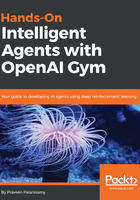
What is an intelligent agent?
A major goal of artificial intelligence is to build intelligent agents. Perceiving their environment, understanding, reasoning and learning to plan, and making decisions and acting upon them are essential characteristics of intelligent agents. We will begin our first chapter by understanding what an intelligent agent is, from the basic definition of agents, to adding intelligence on top of that.
An agent is an entity that acts based on the observation (perception) of its environment. Humans and robots are examples of agents with physical forms.
Software agents are computer programs that are capable of making decisions and taking actions through interaction with their environment. A software agent can be embodied in a physical form, such as a robot. Autonomous agents are entities that make decisions autonomously and take actions based on their understanding of and reasoning about their observations of their environment.
An intelligent agent is an autonomous entity that can learn and improve based on its interactions with its environment. An intelligent agent is capable of analyzing its own behavior and performance using its observations.
In this book, we will develop intelligent agents to solve sequential decision-making problems that can be solved using a sequence of (independent) decisions/actions in a (loosely) Markovian environment, where feedback in the form of reward signals is available (through percepts), at least in some environmental conditions.